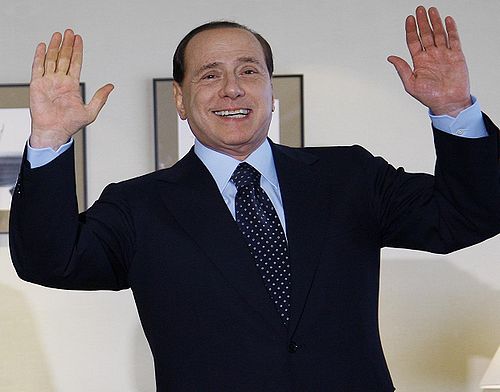Berlusconi’s Austere Grip
 Two weeks ago, the world looked anxiously at Italy. Italy’s debt seemed dangerously high, and its leader, Silvio Berlusconi, faced criticism from political leaders both inside and outside his country. Now the situation has come to the brink of crisis. Distress has given way to predictions of Italy defaulting and bringing the rest of the eurozone down with it. The situation has grown so dire that it has forced Berlusconi, who has dominated Italian politics for decades and survived over 50 votes of confidence, to announce that he will resign after austerity measures are passed.
As Greece tries desperately to put together a unity government that can pull its country together, Italy is poised to follow in its footsteps on a much grander scale. With money markets spooked, Italy now has to pay 6.05 percent interest to borrow money for a year – more than 24 times more than the 0.25 percent that Germany pays. Creating a self-fulfilling prophecy, these numbers are making grim predictions that Italy’s solvency is pushing the country to the brink. With a debt burden of nearly 120 percent of GDP and a barely-existent growth rate of 0.75 percent, it seems unlikely that Italy will be able to continue to finance its debt without extraordinary action.
Two weeks ago, the world looked anxiously at Italy. Italy’s debt seemed dangerously high, and its leader, Silvio Berlusconi, faced criticism from political leaders both inside and outside his country. Now the situation has come to the brink of crisis. Distress has given way to predictions of Italy defaulting and bringing the rest of the eurozone down with it. The situation has grown so dire that it has forced Berlusconi, who has dominated Italian politics for decades and survived over 50 votes of confidence, to announce that he will resign after austerity measures are passed.
As Greece tries desperately to put together a unity government that can pull its country together, Italy is poised to follow in its footsteps on a much grander scale. With money markets spooked, Italy now has to pay 6.05 percent interest to borrow money for a year – more than 24 times more than the 0.25 percent that Germany pays. Creating a self-fulfilling prophecy, these numbers are making grim predictions that Italy’s solvency is pushing the country to the brink. With a debt burden of nearly 120 percent of GDP and a barely-existent growth rate of 0.75 percent, it seems unlikely that Italy will be able to continue to finance its debt without extraordinary action.
The reaction from Europe and the international community has been strikingly similar to their response toward Greece. Berlusconi has agreed to push aggressive new austerity measures, despite the horrendous Italian growth rate. Olli Rehn, the European Union’s Economic Affairs Commissioner, says he wants answers from Italy about how it plans to implement its promised reforms by the end of the week. This did not turn out so well for Greece. Austerity has only caused Greece’s economy to contract further, trapping it in an apparently never-ending cycle of economic stagnation and political crisis.
It is far from certain whether Italy will agree to such severe changes to its budget, despite the EU and Berlusconi’s wishes. Berlusconi succeeded in pushing through his measures on Tuesday, but only because the opposition boycotted the vote. He mustered up far fewer votes than the majority he needs to stay in power, forcing him to announce that he will resign within a few months as soon as the austerity measures are put into place. Facing intense political pressure, he will step down as soon as he does the bidding of European finance. He has said as much himself, “Once this finance law is approved, along with the amendments on everything which Europe has asked of us and which the Eurogroup [a meeting of eurozone finance ministers] has asked for, I will resign, so that the head of state can open consultations.” Markets seem to be pleased. European stock markets rallied over the weekend amid rumors of Berlusconi’s resignation and his announcement on Tuesday sent the euro soaring against the dollar.
Italians, who face high unemployment and an economy with close to no growth, are likely not to be quite as thrilled about this belt tightening. It is now clear that Berlusconi’s grip on power is slipping, but austerity may have a tighter hold. The world can only bite its nails as it waits to see if the bitter pill of fiscal contraction goes down easier in Italy than it has in Greece.
